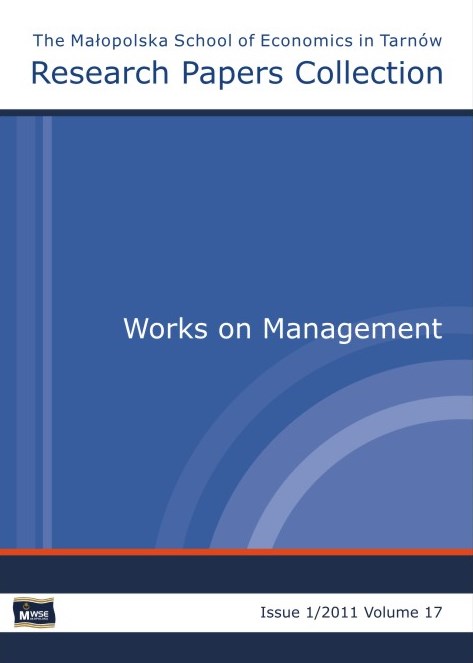Abstract
Abundant and extensive literature on training and employee development contains, apart from description of training methods, more and more information about evaluation of effectiveness of this process. Cooperative learning involves deepened reflection of a learner and discussion with other participants of the course. Knowledge is created during the learning process and its aim is to comprehensively process the situation. A teacher is a participant in this process, an advisor who cooperates, searches and shapes the active learning environment. The aim of the article is to present the method of cooperative learning and determine the factors that may significantly influence the effectiveness of training based on this method. The article contains theoretical remarks regarding cooperative learning process as well as the nature of factors conditioning the effectiveness of the training process.
References
Armstrong M., Zarządzanie zasobami ludzkimi, Wyd. 4, Oficyna Wolters Kluwer, Kraków 2007. ISBN 978-83-7526-171-4.
View in Google Scholar
Ausenda G., On Effectiveness, Boydell Press, Woodbridge 2003. ISBN 1-84383-021-3.
View in Google Scholar
Campbell R.J., Kyriakides L., Muijs D., Robinson W., Assessing Teacher Effectiveness: Developing a Differentiated Model, Routledge Falmer, New York 2004. ISBN 0-415-30478-4.
View in Google Scholar
Fisher D., Frey N., Better Learning Through Structured Teaching: A Framework for the Gradual Release of Responsibility, Chapter 4: Collaborative Learning: Consolidating Thinking with Peers, ASCD, Alexandria 2008. ISBN 978-1-4166-0635-2.
View in Google Scholar
Ford J.K. (ed.), Improving Training Effectiveness in Work Organizations, Lawrence Erlbaum Associates, Mahwah 1997. ISBN 0-8058-1387-X.
View in Google Scholar
Meger Z., Kooperatywne uczenie się w warunkach e-learningu, „E-mentor” 2005, nr 5. ISSN 1731-7428.
View in Google Scholar
Meger Z., Podstawy e-learningu. Od Shannona do konstruktywizmu, „E-mentor” 2006, nr 4. ISSN 1731-7428.
View in Google Scholar
Mujis D., Reynolds D., Effective Teaching: Evidence and Practice, SAGE Publications, Thousand Oaks 2005. ISBN 1-4129-0165-0.
View in Google Scholar
Peszko A., Podstawy zarządzania organizacjami, Wydawnictwo Akademii Górniczo-Hutniczej, Kraków 2002. ISBN 83-85408-78-X.
View in Google Scholar
Phillips J.J., Stone R.D., Phillips P.P., Ocena efektywności w zarządzaniu zasobami ludzkimi. Praktyczny podręcznik pomiaru rentowności inwestycji, Human Factor, Kraków 2003. ISBN 83-918501-0-2.
View in Google Scholar
Podgórski J., Główne założenia poznania rozproszonego a sposób opisywania procesów poznawczych w określonej wspólnocie, „Hommo Communicativus” 2008, nr 1. ISSN 1896-3049.
View in Google Scholar
Roberts T.S., Online Collaborative Learning: Theory and Practice, Hershey, Pasadena 2004. ISBN 1-59140-174-7.
View in Google Scholar
Tu Chih-Hsiung, Online Collaborative Learning: Twenty-One Designs to Building an Online Collaborative Learning Community, Libraries Unlimited, Westport 2004. ISBN 1-59158-155-9.
View in Google Scholar
© Copyright by Małopolska School of Economics in Tarnów. The articles are available under the Creative Commons Attribution NonCommercial-NoDerivatives 4.0 International License


